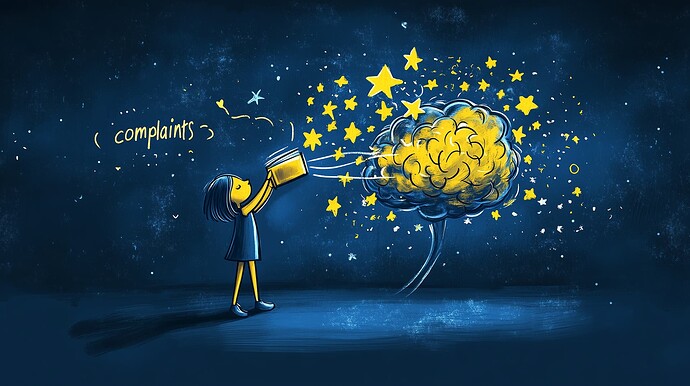“How was your day?”
“Good. Well, actually… not.”
That’s my daughter.
And that’s me.
She told me about an ouch she had.
I get it—because I do the same.
I know how the brain works. It stores painful experiences first—makes sense, right?
If you stumble down the stairs, your brain wants that pain to remind you—every time you go up or down—to hold the rail. Be careful or else!
So yeah. I get that.
I’ve always been like that—and I see it in my daughter’s answer, too.
I’ve also realized: I don’t want to live by the animal way of remembering life.
That’s been a journey for me.
I’ve learned—often the hard way—that simple uplifts matter. Why? Because I’ve ended too many days feeling like ‘nothing good’ happened… even when it wasn’t true!
But it’s like… if you’ve got one bag and a rotten apple is sitting in there, it kind of takes over. Even if there’s just one… and you reach in and your thumb goes right through it—
Ew. Gross. Bleh.
“How was your day?”
A better question might be…
“What did I savor today?”
If the answer is “nothing”… either life needs some recalibrating—or we missed it. Because something was probably savor-worthy.
I start my day with coffee.
The heat of the mug. The smell. Even just holding it.
Oh. So. Good.
“What uplifted me a bit today?”
You’ll notice I said “a bit.”
I’m not asking for heaven.
Just… what gave me a little boost?
Oh. That little white flower.
Or that blanket of wild violets—so beautiful. (They’re even tasty, by the way.)
“How was your day?”
I realized I’d been avoiding what others call a “gratitude list.”
Because by default, I was collecting all the things that were a struggle. That went wrong. That my brain decided were crucial to remember… or else!
So there was a bit of rebellion around a gratitude list.
I tapped on that.
That’s the beauty of EFT Tapping: it helps me shift.
I’m changing what gets stored—on purpose.
Now, at the end of my day, I say… a kind of grace.
And it looks like this: a bunch of bullet points.
- What did I savor?
- What lifted me, even a little?
- What am I honestly and truly grateful for?
It turns fleeting moments into… I want THIS in my long-term memory.
It might seem simple. And yet—I do want my body, mind, and spirit to integrate it… As I sleep. As I dream.
I’m three weeks in. And something in me knows: This Matters.
It helps me unwind the tensions of the day.
Helps me reflect and attune to what is thriving.
Even thriving anyway—despite whatever else happened.
And I’m noticing my recollections of The Good Stuff are getting stronger. And easier.
Moments that are precious indeed.
Worth dreaming about.
“How was your day?”
The other day, my daughter said school was, “Good. Well, not really.” Then she showed me a boo-boo on her hand and one on her knee.
After that, she grabbed a book—Unicorn Academy.
Snuggled up beside me.
Handed me the book.
Smiled.
And we read.
If you could see into my energy, my emotions, my memories forming,
you’d notice that that moment—her reading with me—is far more vivid than her complaints.
I share, authentically, that it wasn’t always that way.
It’s been a journey.
Decades of interpreting most of life as complaint-worthy… even when it wasn’t.
But I see now—mercifully— that the more we attune ourselves to what is uplifting, the more those blessings become accessible.
It quiets the noise.
It removes the rotten apples.
It gives us a taste of juicy goodness.
And no—of course not all of life is juicy goodness.
But that doesn’t mean there isn’t some…
Here.
Now.
For you. For me. For us.
May you discover those simple uplifts.
Build upon them.
Amplify them.
Magnify them.
And store them…
For your future Thriving.
Useful Concepts for Thriving in this Story
-
Awareness
Noticing what our brain tends to store, and gently widening our attention to include what uplifts and blesses. -
Simple Uplifts
Letting small moments of pleasure, connection, and beauty land — and consciously including them in what we remember. -
Reframing
Shifting from the default negativity bias toward a narrative that includes delight, grace, and choice. -
Acceptance
Honoring our patterns — even resistance to gratitude — while allowing new practices to emerge gently. -
Useful Questions
Asking ourselves questions like “What did I savor?” that open the door to presence and thriving.
